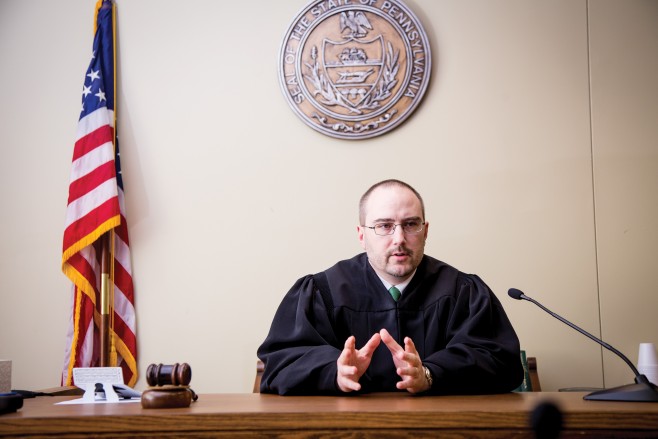
Pennsylvania Judge Jeremiah Zook ’97 believes God has empowered humankind to make rules and enforce consequences. (Photo by Jon Styer)
When facing a difficult decision from the bench, Jeremiah Zook ’97 reminds himself that the voters of Pennsylvania’s 39th Judicial District elected him to make difficult decisions on matters that find their way into his Court of Common Pleas. He reminds himself of his responsibility to protect the peace and security of Franklin and Fulton counties, and he reminds himself that judges are to lay prejudice and passion aside, considering only the law and the facts at hand. When he does this, he finds, those decisions aren’t as hard as they might seem.
In college, Zook had considered an acting career. But after getting married before his senior year, he began to look at jobs with more dependable financial prospects. A Law School Admission Test booklet on the rack outside the career office caught his eye one day. After graduating with a degree in English, he went straight into law school at the University of Akron in Ohio.
He spent much of the next 14 years in the courtroom arguing cases before a judge – briefly in private practice, then as a public defender, mostly as a prosecutor working out of the District Attorney’s office in Chambersburg, Pennsylvania.
“I’ve learned to love the law and love what I do,” he says. Reading and writing are two of his pleasures, and two skills at the heart of a legal career. That his career allows him to help safeguard his community and enables the people in it to rectify their mistakes comes as an added benefit.
Zook had always been interested in judicial office. When a judgeship came open in 2013, he saw opportunity. In Pennsylvania, judges are elected for 10-year terms and only face an uncontested vote of retention as incumbents (which they very rarely lose), so opportunities don’t come often. He won a three-way race comfortably and began his first term as a judge in January 2014.
While court cases often involve fundamentally distasteful situations – arguments, wrongdoing, irresponsibility, tawdriness – Zook says there are also moments of courtroom joy. It’s heartwarming, for instance, when two parents make arrangements wholly for a child’s best interests.
Like many of the people profiled in this issue of Crossroads, Zook has had to reconcile his career in law with the suspicion in which some Mennonites have traditionally held the legal system. In his view, that suspicion is misplaced. God has empowered humankind to make rules, set boundaries and enforce consequences when these are broken.
Take capital punishment, which Zook has long supported. Legislatures in the United States have widely deemed it an appropriate penalty for certain crimes, courts have routinely upheld its constitutionality, and it aligns with Zook’s understanding of God’s will.
He has reconciled himself to the fact that this position does not align with Mennonite teaching. Several years ago, when Zook began prosecuting a capital case, he decided to step down from a leadership position he held at his Mennonite church. (For unrelated reasons, his family now attends a United Brethren in Christ church.)
The legal system, he says, is a fact of life, a presence, a necessity. Like healthcare or education, it touches nearly everyone at some point, and is neither inherently virtuous nor sinful. It just is, and through it, he says, people have tremendous opportunity to enact good in the world: “We’re here on earth, and we have to engage the world.”